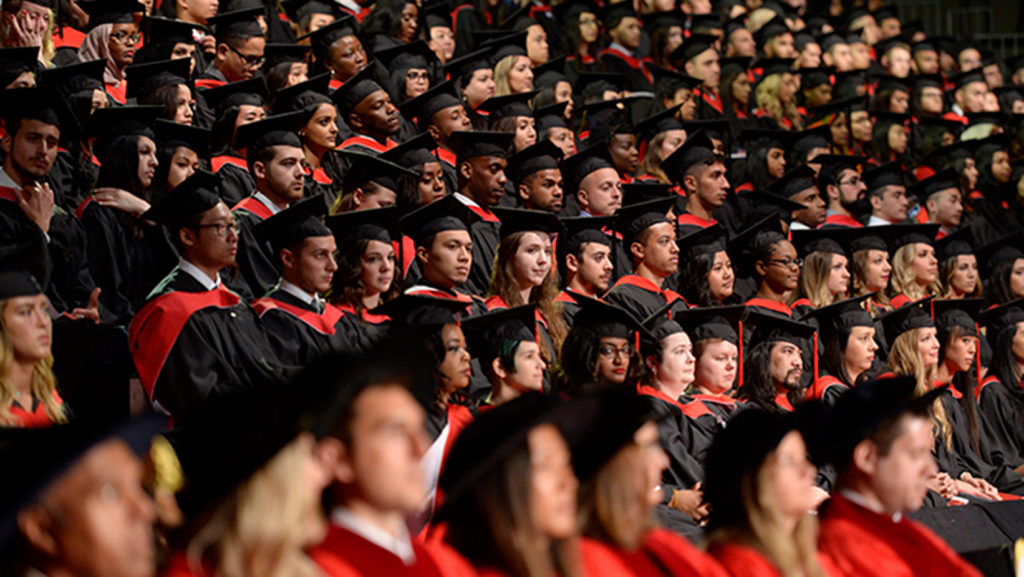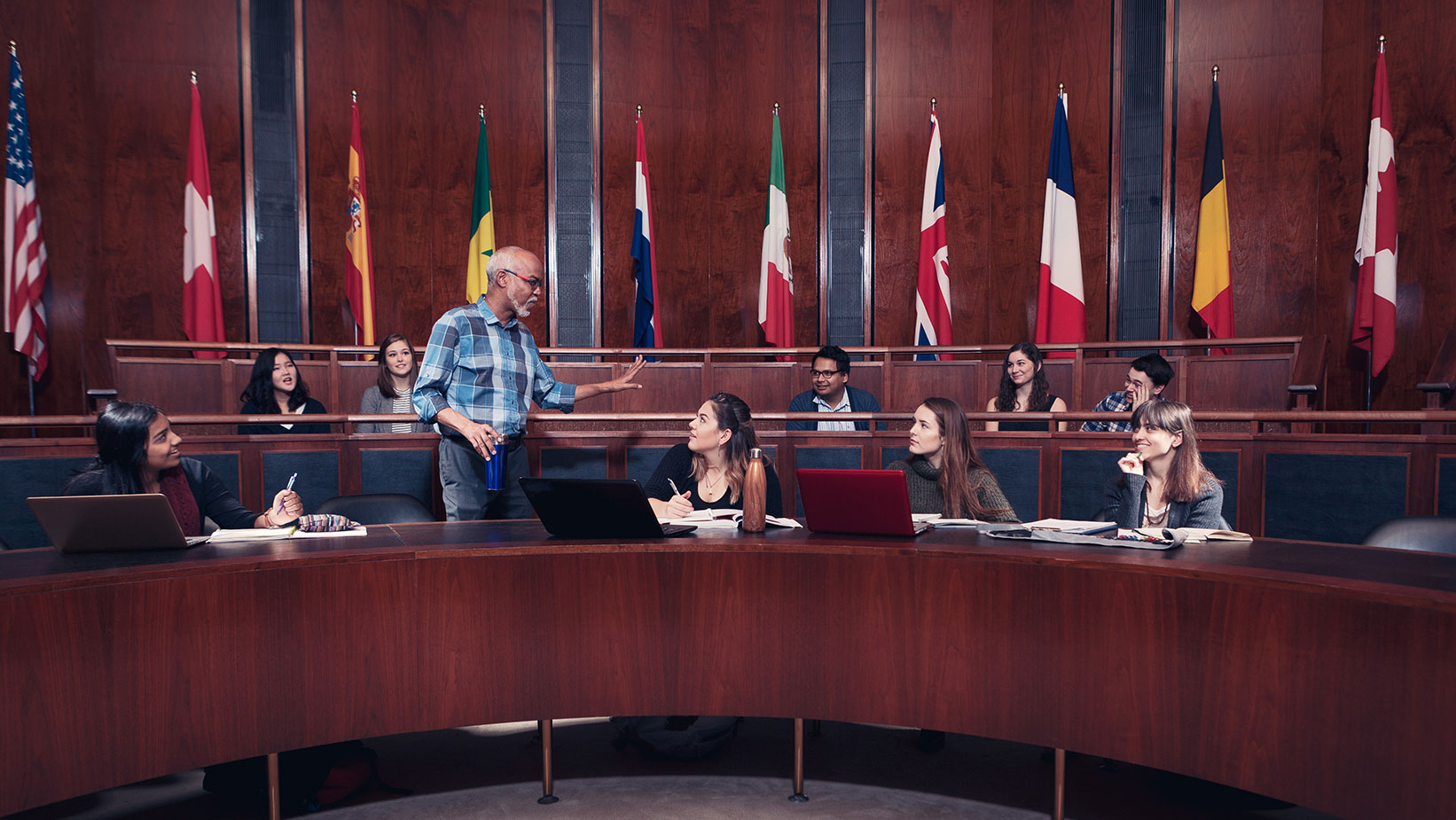Political Science asks questions about power and justice — who governs, for what purposes and with what limits — and helps you to find answers in your studies. Empowered citizens can not only describe and explain society but also use their understanding to change it. In Political Science, you’ll examine citizenship and government in Canada and around the world, international relations, public policies, war and peace, human rights, and more.
Our program fosters rigorous analysis, clear thinking and effective communication on the major issues affecting our globalized world. You’ll learn these skills in dynamic, innovative and small classes, with the personalized attention Glendon is known for. Explore what each year of your degree could look like, as well as how you can boost your major and career options.
Wondering what each year of your degree will look like? Check it out here.
Courses
You’ll find diverse and unique courses taught in small, interactive class settings, such as The Politics of Science, International Relations Through Film & Literature, Politics of the Middle East & North Africa, Illiberal Politics and Public Law.
About three-quarters of the elective courses offered in Political Science are taught in English, with the remainder in French or bilingual. Taking six credits of Political Science courses in your second official language typically allows you to complete Glendon’s language requirement for graduation.

Course Catalogue
GL/POLS 2000 3.0 : Foundations of Political Science
Calendar Description
This course introduces students to the discipline of political science, its key concepts, driving questions, and modes of inquiry across four subfields: Comparative Politics, International Relations, Canadian Politics, and Political Theory. Coursework emphasizes reading, writing, and critical thinking about politics.
GL/POLS 2000 3.0 : Fondements de la science politique
Description de l’annuaire
Ce cours présente aux étudiants la discipline de la science politique, ses concepts clés, ses questions, et ses modes d’enquête dans quatre sous-domaines: la politique comparée, les relations internationales, la politique canadienne et la théorie politique. Le cours met l’accent sur la lecture, l’écriture et la pensée critique sur la politique.
GL/POLS 2950 3.0 : Globalization & Global Governance
Cross-listed: GL/ILST 2950 3.00 EN
Calendar Description
This course examines the politics, processes, and key problems of global governance in the 21st century, with a special emphasis on the United Nations, international law, and transnational advocacy on the issues of global health, trade, human rights, environment, and crime.
GL/POLS 3135 3.0 : Public Law I: The Constitution and the Courts in Canada
Calendar Description
An examination of the Canadian court structure, judicial review of federalism, the role of courts and lawyers, and the relationship between law, politics and public policy. Using technology-enhanced learning, students participate in electronic discussions and mock trials.
Course credit exclusions: None.
PRIOR TO FALL 2009: Course credit exclusions: AK/AS/POLS 3135 3.00, AK/POLS 3405 6.00 (prior to Fall/Winter 2006-2007), AK/SOCI 3405
GL/POLS 3136 3.0 : Public Law II: The Charter of Rights and Freedoms and the Limits of Public Administration
Calendar Description
We focus on the Canadian Charter of Rights and Freedoms, including freedom of expression, legal rights, equality rights, language rights, aboriginal people’s rights and judicial review of public administration. NCR Note: No credit will be retained for this course for students who successfully completed AK/POLS/SOCI 3561 6.00 in Fall/Winter 2005-2006.
Course credit exclusion: AP/SOSC 3360 6.00.
GL/POLS 3212 3.0 : Les relations intergouvernementales au Canada
Description de l’annuaire
Ce cours porte sur le fédéralisme canadien, s’attardant particulièrement aux relations entre le gouvernement fédéral et les provinces. Nous étudions les arrangements institutionnels, formels et informels, structurant la relation entre les deux niveaux de gouvernements. Condition préalable : GL/POLS 2500 6.00 ou GL/POLS 2600 6.00 ou la permission du départment.
GL/POLS 3221 3.0 : Politics of Development: Issues and debates in the Global South
Calendar Description
This course analyzes the contested concept of development and the theories, actors, issues, and debates affecting countries in the Global South. Students learn about the majority of the population who are excluded from both meaningful political participation and economic benefits.
GL/POLS 3222 3.0 : European Politics
Calendar Description
This course provides an overview of the politics of various European countries, including the UK, France, Germany, Spain, Italy, Poland, Greece, etc. Topics covered include economic development, democracy/authoritarianism, political parties, key political leaders, events in recent political history, etc.
GL/POLS 3224 3.0 : European Public Policy
Calendar Description
This course examines public policy in Europe from a comparative and multilevel perspective. Policy fields that may be considered include economic and industrial policy, environmental and agricultural policy, social and health policy, cultural policy, citizenship and immigration, and foreign policy.
GL/POLS 3235 3.0 : International Relations Through Film and Literature
Calendar Description
This course critically analyses theories and concepts in international relations through films and literary works, with a particular focus on war, conflict and US foreign policy. Epistemology and method are addressed alongside pivotal wars of the last century.
GL/POLS 3240 3.0 : Canadian Public Policy
Calendar Description
The course examines the policymaking process in Canada. It looks at the political, economic and social context of policymaking. Special attention is paid to particular policy areas such as the environment, social welfare policies, financial services sector policy, and telecommunications. Prerequisite: GL/POLS 2500 6.00 or GL/POLS 2600 6.00 or permission of the Department. Course credit exclusion: GL/POLS 3240 6.00.
GL/POLS 3241 3.0 : Globalization and Public Policy
Calendar Description
The course examines the effects of globalization on the policymaking environment. It looks at the policy role of international organizations including how these organizations shape the domestic policy process. The impact of globalization on specific policy fields is also analyzed. Prerequisite: GL/POLS 2500 6.00 or GL/POLS 2920 6.00 or permission of the Department.
GL/POLS 3260 3.0 : Politique publique comparée
Description de l’annuaire
S’appuyant sur des études de cas provenant de plusieurs pays, ce cours compare l’influence des institutions, des intérêts et des idées dans le développement et la mise en oeuvre des politiques publiques. Condition préalable : GL/POLS 2510 6.00 ou permission du département. Cours incompatible : GL/POLS 3260 6.00.
GL/POLS 3350 3.0 : Communist and Post-Communist Politics
Calendar Description
This course examines the politics of various communist and post-communist societies, including Eastern Europe, China, North Korea, and Cuba. It analyzes how these countries/regions functioned under communism, as well as the reforms in Eastern Europe and China.
GL/POLS 3360 3.0 : Politics in Quebec/La politique du Québec
Description de l’annuaire
An introduction to the forces, processes and institutions of political life in Quebec and an analysis of them in terms of the concepts and models of political science./Une introduction aux forces, aux interactions et aux institutions de la vie politique de Quebec ainsi que leur analyse selon les concepts et les modèles de la science politique.
Course credit exclusion: AP/POLS 3120 3.00
GL/POLS 3460 3.0 : Ontario Government and Politics
Calendar Description
This course analyzes the institutions and operation of Ontario’s provincial government and political system in the context of Canadian federalism. Consideration of Ontario’s political parties, electoral system, organization of government, and policy in a range of areas.
Course credit exclusion: AP/POLS 3175 3.00.
GL/POLS 3500 3.0 : Democracy and Representation
Calendar Description
This course analyzes political representation in democratic thought and practice. It considers normative, analytical, and empirical perspectives on political parties, elections, the media, and social movements, focusing on the politics of recognition and representation of interests and identities.
GL/POLS 3527 3.0 : Political Theory
Calendar Description
This core course addresses debates in political theory about the structure and purpose of politics. Topics may include liberalism, conservatism, authoritarianism, other contemporary ‘-isms’, plus foundational texts in the history of political thought. Coursework emphasizes analytic reading and communication.
Course credit exclusions: GL/POLS 2485 6.00, GL/POLS 2490 6.00, AP/POLS 2000 6.00.
GL/POLS 3527 3.0 : Théorie politique
Description de l’annuaire
Ce cours de base aborde les débats en théorie politique sur la structure et l’objectif de la politique. Les sujets peuvent inclure le libéralisme, le conservatisme, l’autoritarisme, d’autres «-ismes» contemporains, ainsi que des textes fondateurs de l’histoire de la pensée politique. Le cours met l’accent sur la lecture analytique et la communication.
Cours incompatibles : GL/POLS 2485 6.00, GL/POLS 2490 6.00, AP/POLS 2000 6.00.
GL/POLS 3528 3.0 : Comparative Politics
Calendar Description
This core course addresses key concepts, methods, and ideas for the comparative study of politics. Coursework emphasizes reading, writing, and critical analysis. Topics may include democracy and authoritarianism, economic development and globalization, electoral systems, collective action, and national identity.
Course credit exclusions: GL/POLS 2510 6.00, AP/POLS 2400 3.00, AP/POLS 2950 6.00.
GL/POLS 3528 3.0 : Politique comparée
Description de l’annuaire
Ce cours de base aborde les concepts, méthodes et idées clés pour l’étude comparative de la politique. Le cours met l’accent sur la lecture, l’écriture et l’analyse critique. Les sujets peuvent inclure la démocratie et l’autoritarisme, le développement économique et la mondialisation, les systèmes électoraux, l’action collective et l’identité nationale.
GL/POLS 3550 3.0 : Politics and Place: Structure of Local Government
Calendar Description
This course examines the structures and responsibilities of Canadian municipal government with an emphasis on their connection to problems such as the deteriorating environment, crime and economic overdevelopment.
GL/POLS 3602 3.0 : Illiberal Politics
Cross-listed to: GL/ILST/PHIL 3602 3.00 EN
Calendar Description
This course examines challenges to modern liberalism from both the illiberal left and right, including fascism and totalitarianism,
authoritarianism and populism, Leninism/Stalinism, anarchism, and the so-called “alt-right.”
GL/POLS 3615 3.0 : International and Transnational Organizations
Cross-listed: GL/ILST 3615 3.00 EN
Calendar Description
This course examines several instances of multilateral cooperation in the world over the last century, between states (international organizations) and across states (transnational organizations) in areas such as economic regulation, peace, human rights, migration, and the environment.
GL/POLS 3625 3.0 : Canadian Government and Politics
Cross-listed: GL/CDNS 3625 3.00 EN
Calendar Description
This core course addresses the main features of Canadian government and democracy. Topics may include
Canadian political institutions and their evolution, the Constitution and the Charter, federalism, regionalism,
public administration, and the politics of language, identity, class, and Indigenous peoples.
Course credit exclusions: GL/POLS/CDNS 2600 6.00, AP/POLS 2100 3.00.
GL/POLS 3625 3.0 : Politique canadienne
Co-inscrit: GL/CDNS 3625 3.00 FR
Description de l’annuaire
Ce cours de base aborde les caractéristiques principales du gouvernement canadien et de la démocratie. Les sujets peuvent inclure les institutions politiques canadiennes et leur évolution, la Constitution et la Charte, le fédéralisme, le régionalisme, l’administration publique et la politique de la langue, de l’identité, de la classe et des peuples autochtones.
Cours incompatibles : GL/POLS/CDNS 2600 6.00, AP/POLS 2100 3.00.
GL/POLS 3626 3.0 : International Relations
Cross-listed: GL/ILST 3626 3.00 EN
Calendar Description
This core course addresses key concepts, theories, and dilemmas that animate international relations in theory and practice. Coursework emphasizes reading, writing, and critical analysis. Topics may include war and peace, security, international law and organization, human rights, trade, and inequality.
Course credit exclusions: GL/POLS/ILST 2920 6.00, AP/POLS 2201 3.00, AP/POLS 2940 6.00.
GL/POLS 3626 3.0 : Relations internationales
Co-inscrit: GL/ILST 3626 3.00 FR
Description de l’annuaire
Ce cours de base aborde les concepts clés, les théories et les dilemmes qui animent les relations internationales en théorie et en pratique. Le cours met l’accent sur la lecture, l’écriture et l’analyse critique. Les sujets peuvent inclure la guerre et la paix, la sécurité, le droit et l’organisation internationale, les droits de l’homme, le commerce et les inégalités.
Cours incompatibles : GL/POLS/ILST 2920 6.00, AP/POLS 2201 3.00, AP/POLS 2940 6.00.
AVANT AUTOMNE 2009: Cours incompatible: AK/AS/WMST 3527 3.00.
GL/POLS 3628 3.0 : The Politics of Science
Cross-listed: GL/NATS 3628 3.00 EN
Calendar Description
This course analyzes the intersection between political science and the natural sciences. Topics examined include environmental politics, the political impact of changing technology, as well as the political aspects of natural resources, drugs, health/disease, and pandemics.
GL/POLS 3647 3.0 : Médias et politiques
Co-inscrit: GL/SOSC 3647 3.00 FR
Description de l’annuaire
Ce cours vise à analyser de façon critique les enjeux du paysage médiatique actuel et les liens avec le domaine politique. Les thèmes abordés sont les suivants : médias et propagande, nouvelles technologies et information continue, concentration de la presse et débats démocratiques, mondialisation et standardisation.
GL/POLS 3667 3.0 : War, Power, and Sovereignty: Early Modern Political Theory I
Cross-listed to: GL/PHIL/HIST/HUMA 3667 3.00
Calendar Description
This course examines concepts such as war, power, and sovereignty through the works of thinkers such as Machiavelli, Hobbes, and Locke not as abstract ideas but as responses to, comments on, defences, or critiques of historical events and social realities.
Prerequisites: none required, but students can acquire recommended background by taking GL/HIST 2905 6.00, GL/HIST 3225 3.00, GL/HIST 3436 3.00, GL/PHIL 1690 6.00, GL/PHIL 2620 6.00, GL/PHIL 2645 6.00, GL/POLS 2485 6.00 or GL/POLS 2920 6.00.
Course credit exclusion: GL/POLS 3660 6.00.
GL/POLS 3668 3.0 : Community, Liberty, and Institutions: Early Modern Political Theory II
Cross-listed to: GL/PHIL/HIST/HUMA 3668 3.00
Calendar Description
This course examines concepts such as community, liberty, and institutions through the works of thinkers such as Rousseau, Madison, Mill, and Marx not as abstract ideas but as responses to, comments on, defences, or critiques of historical events and social realities.
Prerequisites: none required, but students can acquire recommended background by taking GL/HIST 2905 6.00, GL/HIST 3225 3.00, GL/HIST 3436 3.00, GL/PHIL 1690 6.00, GL/PHIL 2620 6.00, GL/PHIL 2645 6.00, GL/POLS 2485 6.00 or GL/POLS 2920 6.00.
Course credit exclusion: GL/POLS 3660 6.00.
GL/POLS 3671 3.0 : Latin American Politics and Society
Cross-listed to: GL/ILST 3671 3.00
Calendar Description
This course analyzes key themes of Latin American politics and society, providing overviews of Argentina, Chile, Brazil, Mexico, Venezuela, Peru, Colombia, and more. Topics include economic development, democracy, authoritarianism, political leaders, major events in recent political history, culture, and society.
GL/POLS 3685 3.0 : Politique comparée des pays en voie de développement
Co-inscrit: GL/ILST 3685 3.00 FR
Description de l’annuaire
Ce cours analyse de façon comparative la politique des pays en voie de développement, incluant les États d’Amériques, d’Afrique et d’Asie du Sud-est. Il étudie les sytèmes politiques ainsi que les grandes orientations du développement international.Condition préalable : GL/POLS 2510 6.00 ou GL/POLS 2920 6.00. Cours incompatible : GL/POLS 3220 6.00.
GL/POLS 3686 3.0 : Politics of the Middle East and North Africa
Cross-listed: GL/ILST 3686 3.00 EN
Calendar Description
This course surveys core themes in the comparative politics of the Middle East and North Africa such as state formation and (de)colonization, authoritarianism and democratization, migration, social movements, gender, and religion and politics, through comparative and interdisciplinary perspectives.
GL/POLS 3694 3.0 : Cities, Migrants, and the Politics of Belonging
Cross-listed: GL/ILST /SOCI 3694 3.00 EN
Calendar Description
This course examines how migrants shape cities and vice versa, considering literatures on urban citizenship, human mobility, local governance, and migrant rights. It considers analytical, empirical, and normative perspectives on the relationship between migration and the creation and maintenance of state borders.
GL/POLS 3720 3.0 : American Government and Politics
Calendar Description
This course analyzes the politics, policies, and key political institutions of the U.S., focusing on the presidency, legislative process, federalism, courts, political parties, and central patterns and key transformative periods in American political history of the past century. Note: open to first-year students.
Course credit exclusions: GL/POLS 3230 6.00, GL/POLS 3721 3.00, AP/POLS 3540 3.00.
GL/POLS 3721 3.0 : American Political Institutions
Calendar Description
This course analyzes the key political institutions of the United States, focusing on the presidency, the legislative process, federalism, the courts, and political parties. Note: open to first-year students.
Course credit exclusions: GL/POLS 3230 6.00, AP/POLS 3540 3.00.
GL/POLS 3810 3.0 : Norms and Practices in Global Politics
Calendar Description
This course examines how norms shape identities, actions, and outcomes in international relations. Students analyze how norms emerge, spread, become institutionalized, vary in application, change, and are contested in areas such as global security, health, environment, and finance.
GL/POLS 4100 3.0 : Individual Thesis
Calendar Description
An opportunity for students to pursue their individual interests in political science in either language under the guidance of a staff member. Note: Permission of the Chair required.
GL/POLS 4100 3.0 : Travail individuel
Description de l’annuaire
Le département de science politique permet aux étudiant(e)s de prendre des cours de lectures dirigées (individuels) jusqu’à un maximum de neuf crédits. Ces cours sont initiés par les étudiants qui doivent présenter un sujet au professeur qui, ensuite, décide si elle/il peut ou veut encadrer le projet. Les cours requièrent habituellement un ou deux travaux, ou une série de lectures à faire et à discuter avec le/la professeur(e).
GL/POLS 4212 3.0 : Political Ethics
Calendar Description
This course examines ethical problems and paradoxes that arise in modern political life. It emphasises theoretical and practical perspectives with particular attention to political ethics in democracies. Topics include coercion, justice, secrecy, deception, political violence, corruption, war, and torture.
GL/POLS 4275 3.0 : Public Policy Research
Calendar Description
This course examines the theoretical literature in public policy and the policy sciences. Students engage in individual research for presentation and critical discussion. Prerequisite: GL/POLS 2500 6.00(EN). Course credit exclusion: AP/POLS 4300 6.00 or GL/POLS 4300 6.00.
GL/POLS 4280 3.0 : Canadian Foreign Policy
Calendar Description
This course analyzes Canadian foreign policy, focusing on the policy making process and the tactics of Canadian diplomacy to advance
Canada’s political, economic, and security interests through international organizations and strategic alliances.
Course credit exclusion: AP/POLS 4250 3.00.
GL/POLS 4285 3.0 : Canadian Defence Policy
Cross-listed: GL/CDNS 4285 3.00 EN
Calendar Description
This course examines the evolving social, economic, and global context of Canadian defence policy, including: the impact of geography and history, the nature and diversity of Canadian defence cultures, the Canadian defence establishment, and evolving processes and considerations of defence policy making.
GL/POLS 4320 3.0 : Advanced Theories of Public Administration and Public Policy
Calendar Description
The course aims to prepare students for graduate studies in public administration and public policy by presenting and discussing a variety of contemporary theories; it will allow students to deepen their understanding of this subfield. Prerequisite: GL/POLS 2500 6.00 or permission of the Department.
GL/POLS 4325 3.0 : Relations État et société
Description de l’annuaire
Ce cours présente les grandes approches traitant des relations entre l’État et les acteurs de la société civile (citoyens, groupes d’intérêts et mouvements sociaux) dans le développement des politiques publiques. Nous questionnons le rôle et la place de ces acteurs dans le processus politique et examinons quels types d’influence ils exercent sur les politiques publiques. Conditions préalable : GL/POLS 2500 6.00 ou permission du département.
GL/POLS 4400 6.0 : Political Immersion Abroad Summer Course
Calendar Description
This intensive summer course examines the politics and policies of one or more political systems outside Canada. It features direct experience of comparative politics and internationalization through site visits, exchange with local partners, and political immersion abroad.
Prerequisite: permission of the department.
GL/POLS 4410 3.0 : Democracy and Authoritarianism
Calendar Description
This course analyzes democracy and authoritarianism in various countries throughout the world. Topics include the causes of democratization, democratic backsliding and rising populism worldwide, presidential power and hyperpresidentialism, how different authoritarian regimes work, and the state of American democracy.
GL/POLS 4520 3.0 : Peacekeeping and Peacebuilding
Calendar Description
This course examines the theory and practice of peacekeeping and peacebuilding. Multilateral peace operations continue to expand in size, scope, complexity, and objectives. Case studies and current examples illuminate the history, politics, and day-to-day realities of multilateral peace operations.
GL/POLS 4602 3.0 : Africana Political Economy in Comparative Perspective
Cross-listed: GL/SOCI 4602 3.00 EN
Calendar Description
This course analyzes racial capitalism among persons of African descent in the Global South and Global North, focusing on diaspora communities. Students learn about models for self-determination, solidarity economies and cooperativism as well as theory in Black political economy.
GL/POLS 4605 3.0 : Foreign Policy in Theory and Practice
Cross-listed: GL/ILST 4605 3.00 EN
Calendar Description
This course introduces some of the principal theoretical models for the study of foreign policy and continues with a study of the means by which foreign policy is made and implemented. Means of implementation studied include diplomacy, economic measures, propaganda, military means and covert action. Prerequisite: GL/POLS 2920 6.00 or GL/POLS 3626 3.0 (EN or FR).
GL/POLS 4609 3.0 : Sovereignty
Cross-listed: GL/ILST/PHIL 4609 3.00 EN
Calendar Description
This course examines “sovereignty” and the authority of law. Who can be the sovereign? How does the emergence of sovereignty
relate to the state system? How can the concept help or hinder how we understand political authority and law?
GL/POLS 4610 3.0 : American Foreign Policy
Cross-listed: GL/ILST 4610 3.00 EN
Calendar Description
This course provides an overview and analysis of American foreign policy over the past two centuries. Topics include: factors shaping US foreign policy, US participaton in WWI and WWII, the Cold War, international organizations, regionalism, isolationism, interventionism, and more.
GL/POLS 4613 3.0 : European Integration
Cross-listed: GL/ILST 4613 3.00 EN
Calendar Description
This course examines the study of the major Europe-wide institutions and their role in the diffusion of West European values and governance practices to Eastern Europe. Topics covered include values, such as liberal democracy and capitalism, as well as specific laws, regulations and practices. Course credit exclusions: GL/ILST 4662 3.00, GL/POLS 4662 3.00, GL/POLS 4315 3.00.
GL/POLS 4613 3.0 : Intégration européenne
Co-inscrit: GL/ILST 4613 3.00 FR
Description de l’annuaire
Ce cours porte sur le processus d’intégration européenne, ainsi que sur les institutions de l’Union. En tenant compte des enjeux légaux et normatifs, ce cours présente les défis présents, comme l’élargissement, et les perspectives d’avenir de l’UE. Cours incompatibles : GL/ILST 4662 3.00, GL/POLS 4662 3.00 et GL/POLS 4315 3.00.
GL/POLS 4614 3.0 : American Politics and Society: Summer Course in Washington DC
Cross-listed: GL/SOCI 4614 3.00 EN
Calendar Description
This course examines modern American politics, the political history of the United States, as well as certain aspects of American society and culture. This class will be taught in Washington DC, and includes several educational field trips around the city.
GL/POLS 4636 3.0 : Inclusion, Exclusion, and Difference
Cross-listed: GL/SOSC 4636 3.00 EN
Calendar Description
This course examines debates about inclusion, exclusion, and difference in contemporary political and legal discourse. Drawing on contemporary political theory and court cases, students examine issues surrounding the inclusion or exclusion of ethnic, linguistic, sexual, religious, or other minorities.
GL/POLS 4637 3.0 : Disagreement and Democracy
Cross-listed: GL/SOSC 4637 3.00 EN
Calendar Description
This course surveys and explores the diverse set of contemporary theories of deliberative and participatory politics. Emphasis is placed upon what has been called the ‘deliberative turn’ in democratic theory that prioritizes the role of deliberation in democratic decision making.
GL/POLS 4640 3.0 : The Idea of Democracy
Cross-listed: GL/SOSC 4640 3.00 EN
Calendar Description
This course explores the idea of democracy in terms of its institutions, assumptions, and values. We consider ancient Greek and liberal ideas of democracy and attempt to answer the fundamental question of whether we ask too much or too little of democracy.
GL/POLS 4652 3.0 : Borders, Displacement, and the State
Cross-listed: GL/ILST/SOCI 4652 3.00 EN
Calendar Description
This course analyzes the role of population displacement in state transformation, drawing on both historical and contemporary cases to show how migration both contests and shapes borders and the relationship between citizens, the state, and society more broadly.
GL/POLS 4664 3.0 : Théories de la pratique en relations internationales
Co-inscrit: GL/ILST/SOCI 4664 3.00 FR
Description de l’annuaire
Ce cours présente les modes et pratiques des professionnels de l’international. Nous nous intéressons aux façons par lesquelles les acteurs politiques, sociaux et économiques agissent au-delà des frontières nationales pour affirmer et asseoir leur pouvoir.
GL/POLS 4674 3.0 : Migration and Citizenship
Cross-listed: GL/ILST 4674 3.00 EN
Calendar Description
This course analyzes migration and citizenship policies, immigrant integration and assimilation, the politics of multiculturalism and diversity, transnationalism, refugees and humanitarian concerns, borders and security, and cross-national variation in nationality and migration policies through analytical, normative, and empirical studies.
Course credit exclusion: GL/POLS 4274 3.00
GL/POLS 4681 3.0 : Politique et gestion de la diversité
Co-inscrit: GL/SOCI 4681 3.00 FR
Description de l’annuaire
Ce cours présente et analyse les différents modèles d’intégration et de gestion de la diversité ethnoculturelle dans les régimes démocratiques tels que le multiculturalisme au Canada et en Grande-Bretagne, le républicanisme en France, et l’interculturalisme au Québec et en Belgique.
GL/POLS 4682 3.0 : Transnational Crime and Corruption
Cross-listed: GL/ILST 4682 3.00 EN
Calendar Description
This course examines practical and theoretical aspects of transnational crime and corruption in contemporary global politics. Topics include bribery in international business, money laundering, transnational organized crime, human trafficking, illicit weapons trading, and international efforts to control these problems.
Prerequisite: GL/POLS 2920 6.00 (EN).
GL/POLS 4685 3.0 : The Foreign Policy of the Major Asian States
Cross-listed: GL/ILST 4685 3.00 EN
Calendar Description
A comparative study of the foreign policies in China, Japan and India, with an emphasis on policy-making and policy outputs. Examples will be drawn from territorial, security and economic issues.
GL/POLS 4810 3.0 : Politics and Public Policy in Europe
Calendar Description
Public policy traditionally focuses on domestic politics but decades of integration have significantly altered the conduct of government and governance in Europe. This course analyzes European politics and public policy in areas such as migration, citizenship, borders, economics, and law.
GL/POLS 4915 3.0 : Gouvernance des plateformes numériques. Du “capitalisme de plateforme” au “coopérativisme de plateforme”
Co-inscrit: GL/COMS 4915 3.00
Calendar Description
Les plateformes numériques (Uber, AirBnb, Blablacar) ont investi notre quotidien et ont un impact avéré sur la régulation publique et les façons de faire la politique. Si ces plateformes sont ouvertes à la collaboration de millions d’individus, leur gouvernance est fermée et régie par des mécanismes financiers traditionnels. Le cours propose une analyse pratique et critique des grands types de gouvernance des plateformes numériques.
Degree Types & Program Requirements
The Political Science program offers the following degree types and certificates:
- Specialized Honours BA/iBA
- Honours BA/iBA
- Bachelor of Arts
- Minor
- Certificate in Refugee and Migration Studies
The Political Science program is also available as a bilingual or trilingual international Bachelor of Arts.
This program is also available as a Glendon BA, with flexible language requirements.

Certificate in Refugee and Migration Studies
The state of the world’s refugees has become an issue of global importance. Forced migration is affecting vast numbers of people who find themselves victims of exclusion — and who are often denied a place of asylum.
This certificate program investigates the causes of forced migration, the ethical and legal issues involved, the impact on individuals and refugee communities and the implications for the wider society.
Other Program Details
Meet Our Graduates
Glendon Political Science provides excellent preparation for a wide range of careers in the worlds of law, public policy, journalism, business, banking, non-profit, education, public health, transnational advocacy, international relations, international development, and more. Discover the careers some of our alumni have excelled in and find out what they had to say about their experiences at Glendon.





